Afren PLC Bundle
What Went Wrong at Afren PLC?
Afren PLC, a name once synonymous with ambitious oil exploration in Africa, experienced a meteoric rise and a dramatic fall. Founded in 2004, the company aimed to capitalize on the continent's vast hydrocarbon reserves, quickly becoming a significant player in the energy sector. But what led this independent oil and gas company from London to such a swift downfall?
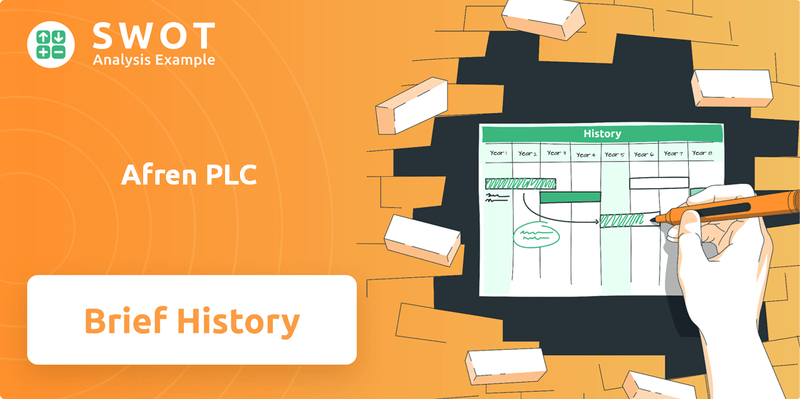
The story of Afren PLC SWOT Analysis is a cautionary tale within the African oil industry. From its early exploration projects in Nigeria to its expansion across several countries, Afren PLC's history showcases the volatile nature of the energy sector. Understanding the brief history of Afren PLC company timeline, including its financial performance and key executives, provides crucial insights into the risks and rewards of operating in emerging markets. The company's collapse offers valuable lessons on corporate governance and the impact of operational instability in the face of fluctuating oil prices.
What is the Afren PLC Founding Story?
The story of Afren PLC, a company with a significant footprint in the African oil and gas sector, began in late 2004 in London, United Kingdom. This Afren PLC's mission was spearheaded by a group of predominantly African investors and directors who envisioned a company focused on oil exploration and production across the continent.
The founders aimed to capitalize on the burgeoning opportunities within the African energy sector, particularly in the Gulf of Guinea. Their strategy was to partner with local entities and provide the necessary capital and technical expertise to develop untapped oil fields. This approach was central to Afren's initial business model.
Key figures in Afren's establishment included Ethelbert Cooper, Dr. Rilwanu Lukman, and Egbert Imomoh. These individuals brought a wealth of experience and insight into the oil and gas industry, which was crucial for the company's early success. Guy Pas, the former CFO of Addax & Oryx Group, also played a key role in the company's foundation.
Afren PLC was founded in London in late 2004 by a group of African investors.
- Focused on oil exploration and production in Africa, particularly the Gulf of Guinea.
- Aimed to support the indigenous oil and gas sector in Nigeria.
- Secured initial 'seed' financing.
- Grew rapidly from a small office to a portfolio of 28 assets by 2012.
The company's initial focus was on Nigeria, the most prolific oil and gas producing nation in sub-Saharan Africa. The founders recognized the potential for partnership-based projects within the country. Afren secured initial funding, with the International Finance Corporation (IFC) of the World Bank Group considering an equity investment. By 2012, the company had expanded significantly, managing a portfolio of 28 assets across 12 countries and producing over 50,000 barrels of oil equivalent per day.
The early success of Afren PLC was marked by its rapid expansion and strategic focus on the African oil market. By 2013, the company's market capitalization reached approximately $2 billion, reflecting investor confidence in its growth potential. However, the company faced significant challenges later on, leading to a decline in its financial performance and eventual collapse.
Afren PLC SWOT Analysis
- Complete SWOT Breakdown
- Fully Customizable
- Editable in Excel & Word
- Professional Formatting
- Investor-Ready Format
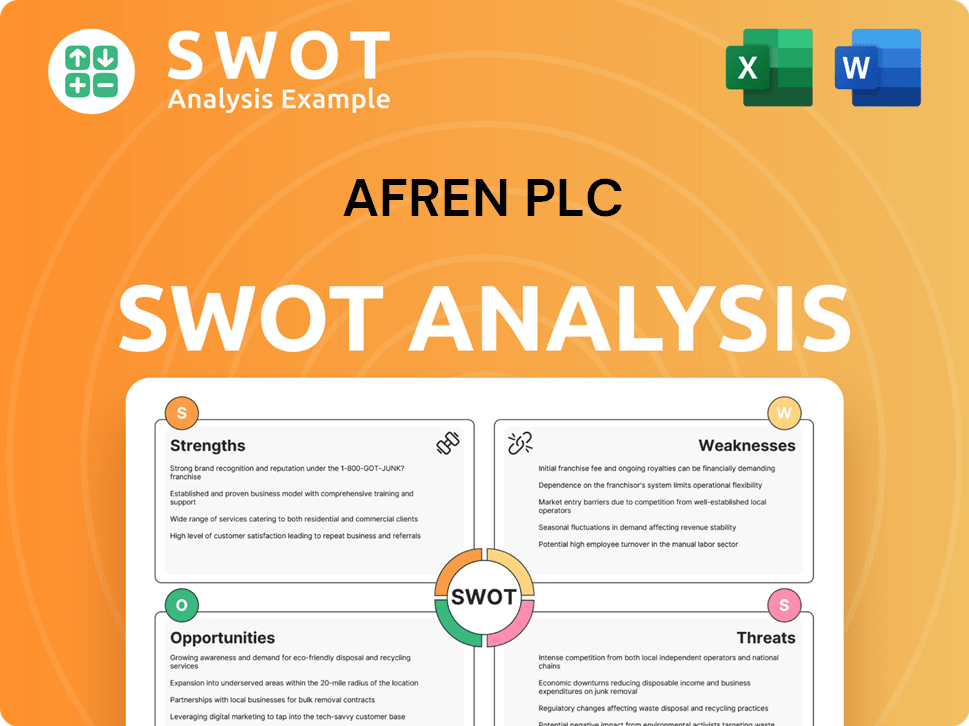
What Drove the Early Growth of Afren PLC?
The early years of Afren PLC, following its 2004 founding and IPO in March 2005, were marked by rapid expansion across the African continent. This growth phase saw the company establish a presence in six countries, including Nigeria, and the successful completion of key projects. By focusing on high-potential areas and building strong partnerships, Afren PLC quickly became a significant player in the African oil and gas industry.
Afren PLC's strategy involved immediate expansion, targeting six African countries: Nigeria, São Tomé & Príncipe JDZ, Gabon, Republic of the Congo, Côte d'Ivoire, and Ghana. This aggressive approach allowed Afren to build a diverse portfolio of assets quickly. This expansion was a key element in Afren's early growth and its aim to become a significant force in the African energy sector.
A cornerstone of Afren's initial success was the completion of major projects in Nigeria. These included the Okoro field, which achieved first oil in June 2008, and the Ebok field. The Okoro Setu Project, Afren's first operated full-field development, showed the company's ability to deliver projects efficiently, achieving first oil within two years.
By 2008, Afren PLC had built a multinational enterprise with 15 assets across six African countries. The company's net working interest production reached over 26,000 barrels of oil equivalent per day. Afren set an ambitious target of 65,000 barrels per day by the end of 2010, demonstrating its rapid growth trajectory.
In 2009, Afren supported the establishment of First Hydrocarbon Nigeria Limited (FHN), in which it held a 45% interest, providing financial and technical support. Afren also entered new markets by acquiring Black Marlin in 2010, gaining a significant early position in key basins. These moves helped Afren PLC expand its footprint in the African oil and gas industry.
Afren PLC PESTLE Analysis
- Covers All 6 PESTLE Categories
- No Research Needed – Save Hours of Work
- Built by Experts, Trusted by Consultants
- Instant Download, Ready to Use
- 100% Editable, Fully Customizable
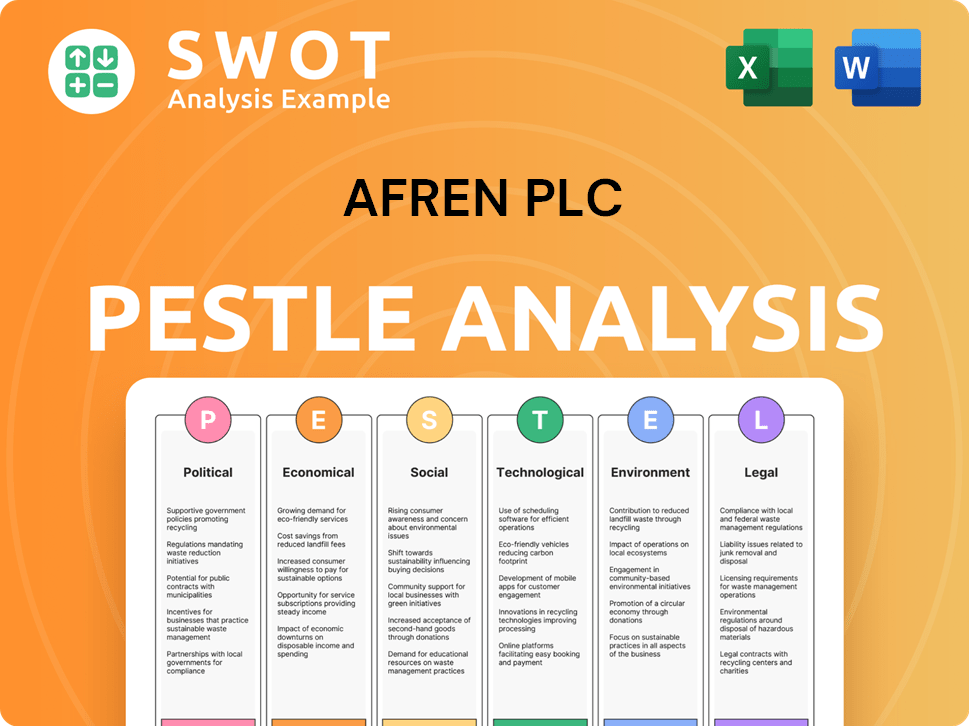
What are the key Milestones in Afren PLC history?
The Afren PLC experienced several significant milestones throughout its existence, particularly in the realm of oil exploration and production. The company's journey included rapid expansion and strategic partnerships that shaped its trajectory within the African oil industry. This brief history of Afren PLC highlights the key achievements and turning points that defined its operational and financial performance.
| Year | Milestone |
|---|---|
| Early 2000s | Afren PLC was established with a focus on oil exploration in Africa. |
| 2009 | Successful development of the Ebok field in Nigeria, boosting production capacity. |
| 2012 | Afren PLC's portfolio expanded to 28 assets across 12 countries, producing over 50,000 barrels of oil equivalent per day. |
| 2013 | Production from the Okoro field in Nigeria significantly contributed to the company's production growth. |
| 2014 | Allegations of unauthorized bonus payments led to a major leadership shakeup within the company. |
| 2015 | Afren PLC defaulted on its 2016 bonds and entered administration, leading to its delisting from the London Stock Exchange. |
Afren PLC was innovative in its approach to the energy sector, particularly in how it engaged with indigenous companies and host governments. This partnership-based strategy was a unique way to operate in Africa and access low-cost reserves. This approach enabled Afren PLC to become a partner of choice in developing oil fields in the Gulf of Guinea.
Afren PLC pioneered a partnership-based approach with indigenous companies and host governments.
This strategy allowed Afren PLC to access low-cost reserves in the African oil industry.
Afren PLC positioned itself as a partner for developing discovered but undeveloped oil fields.
Despite its successes, Afren PLC faced considerable challenges that ultimately led to its downfall. A major crisis erupted in July 2014 due to allegations of unauthorized bonus payments, which significantly damaged stakeholder confidence. The collapse in oil prices in 2014 further exacerbated the financial difficulties, leading to a sharp decline in its cash flow and equity value.
The dismissal of key executives due to the bonus scandal highlighted internal governance issues.
The collapse in oil prices significantly reduced cash flow and equity value.
Operational challenges impacted production targets, hindering restructuring plans.
Afren PLC defaulted on its 2016 bonds by refusing to make a $15 million interest payment.
The company failed to raise sufficient funds, leading to the suspension of shares and administration.
The Afren PLC experience underscores the critical importance of strong corporate governance.
For a deeper understanding of the competitive landscape, consider exploring the Competitors Landscape of Afren PLC.
Afren PLC Business Model Canvas
- Complete 9-Block Business Model Canvas
- Effortlessly Communicate Your Business Strategy
- Investor-Ready BMC Format
- 100% Editable and Customizable
- Clear and Structured Layout
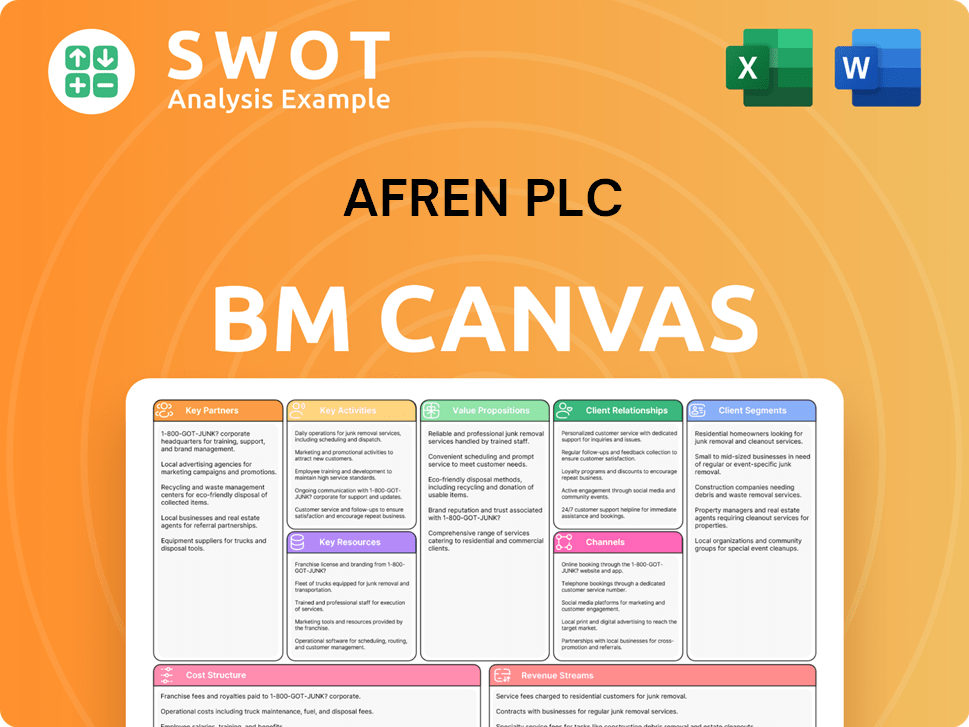
What is the Timeline of Key Events for Afren PLC?
The Afren history is marked by significant milestones and a dramatic downfall. The company, focused on oil exploration in Africa, experienced rapid growth followed by a collapse. Key events include its IPO, initial oil production in Nigeria, and various acquisitions expanding its portfolio. However, allegations of financial misconduct led to leadership changes and ultimately, the company's administration and delisting from the London Stock Exchange in 2015.
| Year | Key Event |
|---|---|
| 2004 | Afren PLC was founded in London, concentrating on oil and gas exploration and production in Africa. |
| March 2005 | The company launched its Initial Public Offering (IPO), initiating its expansion. |
| June 2008 | Afren achieved 'first oil' from the Okoro field in Nigeria, marking its first organic production. |
| 2009 | Afren supported the establishment of First Hydrocarbon Nigeria Limited (FHN), acquiring a 45% interest. |
| 2010 | The company acquired Black Marlin, an East African exploration company, broadening its geographical reach. |
| January 2011 | Afren became the first UK-listed independent E&P company to raise capital from the bond market. |
| 2012 | Afren's portfolio grew to 28 assets across 12 countries, producing over 50,000 barrels of oil equivalent per day. |
| July 2014 | Former CEO and COO were dismissed due to unauthorized payments, significantly impacting confidence. |
| March 2015 | Afren defaulted on its 2016 bonds by missing a $15 million interest payment. |
| April 2015 | Alan Linn was appointed as the new chief executive. |
| July 15, 2015 | Afren shares were suspended from trading due to failure to raise sufficient funds and reduced production levels. |
| July 31, 2015 | Afren PLC filed for administration, having failed to secure refinancing. |
| August 10, 2015 | The company was delisted from the London Stock Exchange. |
Following Afren’s collapse, the Serious Fraud Office (SFO) took action. In July 2020, the SFO issued a confiscation order for over £5.4 million against former executives Osman Shahenshah and Shahid Ullah. This highlights the legal consequences of the financial misconduct that contributed to Afren's demise. This case serves as a cautionary tale for the energy sector.
The Afren company's failure has had lasting implications for the African oil and gas industry. Its assets and exploration opportunities have been re-evaluated and potentially acquired by other entities. The industry continues to evolve, with a focus on market expansion and innovation, particularly in regions like Nigeria, which remains a key area for oil exploration and production. The demise of Afren has influenced how investors and regulators view corporate governance and financial oversight in the energy sector.
The African energy sector is dynamic, with ongoing changes in market dynamics. The collapse of Afren has prompted other companies to reassess their strategies. The focus is on exploration and production, especially in areas with high potential, such as Nigeria. The industry continues to attract investment, but with increased scrutiny on risk management and corporate governance.
The future of oil exploration in regions where Afren operated is being shaped by new players. These companies are adopting advanced technologies and focusing on sustainable practices. This includes the use of data analytics and improved environmental standards. The African oil market is evolving, with increased emphasis on efficiency and responsible resource management.
Afren PLC Porter's Five Forces Analysis
- Covers All 5 Competitive Forces in Detail
- Structured for Consultants, Students, and Founders
- 100% Editable in Microsoft Word & Excel
- Instant Digital Download – Use Immediately
- Compatible with Mac & PC – Fully Unlocked
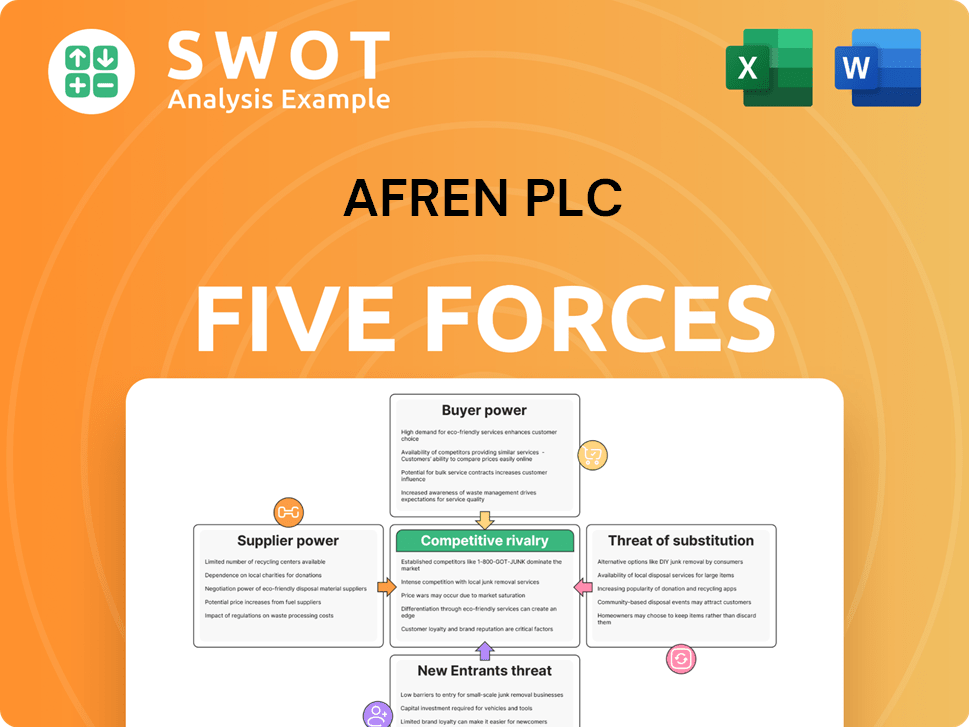
Related Blogs
- What is Competitive Landscape of Afren PLC Company?
- What is Growth Strategy and Future Prospects of Afren PLC Company?
- How Does Afren PLC Company Work?
- What is Sales and Marketing Strategy of Afren PLC Company?
- What is Brief History of Afren PLC Company?
- Who Owns Afren PLC Company?
- What is Customer Demographics and Target Market of Afren PLC Company?
Disclaimer
All information, articles, and product details provided on this website are for general informational and educational purposes only. We do not claim any ownership over, nor do we intend to infringe upon, any trademarks, copyrights, logos, brand names, or other intellectual property mentioned or depicted on this site. Such intellectual property remains the property of its respective owners, and any references here are made solely for identification or informational purposes, without implying any affiliation, endorsement, or partnership.
We make no representations or warranties, express or implied, regarding the accuracy, completeness, or suitability of any content or products presented. Nothing on this website should be construed as legal, tax, investment, financial, medical, or other professional advice. In addition, no part of this site—including articles or product references—constitutes a solicitation, recommendation, endorsement, advertisement, or offer to buy or sell any securities, franchises, or other financial instruments, particularly in jurisdictions where such activity would be unlawful.
All content is of a general nature and may not address the specific circumstances of any individual or entity. It is not a substitute for professional advice or services. Any actions you take based on the information provided here are strictly at your own risk. You accept full responsibility for any decisions or outcomes arising from your use of this website and agree to release us from any liability in connection with your use of, or reliance upon, the content or products found herein.